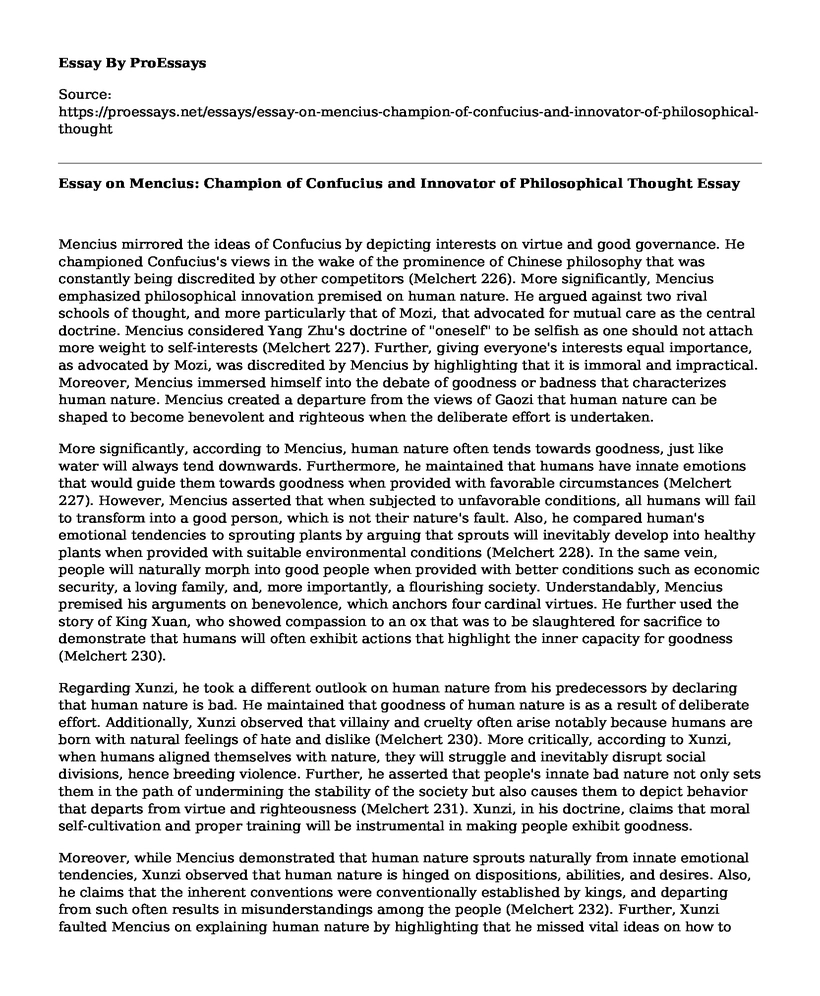Mencius mirrored the ideas of Confucius by depicting interests on virtue and good governance. He championed Confucius's views in the wake of the prominence of Chinese philosophy that was constantly being discredited by other competitors (Melchert 226). More significantly, Mencius emphasized philosophical innovation premised on human nature. He argued against two rival schools of thought, and more particularly that of Mozi, that advocated for mutual care as the central doctrine. Mencius considered Yang Zhu's doctrine of "oneself" to be selfish as one should not attach more weight to self-interests (Melchert 227). Further, giving everyone's interests equal importance, as advocated by Mozi, was discredited by Mencius by highlighting that it is immoral and impractical. Moreover, Mencius immersed himself into the debate of goodness or badness that characterizes human nature. Mencius created a departure from the views of Gaozi that human nature can be shaped to become benevolent and righteous when the deliberate effort is undertaken.
More significantly, according to Mencius, human nature often tends towards goodness, just like water will always tend downwards. Furthermore, he maintained that humans have innate emotions that would guide them towards goodness when provided with favorable circumstances (Melchert 227). However, Mencius asserted that when subjected to unfavorable conditions, all humans will fail to transform into a good person, which is not their nature's fault. Also, he compared human's emotional tendencies to sprouting plants by arguing that sprouts will inevitably develop into healthy plants when provided with suitable environmental conditions (Melchert 228). In the same vein, people will naturally morph into good people when provided with better conditions such as economic security, a loving family, and, more importantly, a flourishing society. Understandably, Mencius premised his arguments on benevolence, which anchors four cardinal virtues. He further used the story of King Xuan, who showed compassion to an ox that was to be slaughtered for sacrifice to demonstrate that humans will often exhibit actions that highlight the inner capacity for goodness (Melchert 230).
Regarding Xunzi, he took a different outlook on human nature from his predecessors by declaring that human nature is bad. He maintained that goodness of human nature is as a result of deliberate effort. Additionally, Xunzi observed that villainy and cruelty often arise notably because humans are born with natural feelings of hate and dislike (Melchert 230). More critically, according to Xunzi, when humans aligned themselves with nature, they will struggle and inevitably disrupt social divisions, hence breeding violence. Further, he asserted that people's innate bad nature not only sets them in the path of undermining the stability of the society but also causes them to depict behavior that departs from virtue and righteousness (Melchert 231). Xunzi, in his doctrine, claims that moral self-cultivation and proper training will be instrumental in making people exhibit goodness.
Moreover, while Mencius demonstrated that human nature sprouts naturally from innate emotional tendencies, Xunzi observed that human nature is hinged on dispositions, abilities, and desires. Also, he claims that the inherent conventions were conventionally established by kings, and departing from such often results in misunderstandings among the people (Melchert 232). Further, Xunzi faulted Mencius on explaining human nature by highlighting that he missed vital ideas on how to cultivate virtue. More imperatively, as opposed to Mencius, Xunzi demonstrated that human nature could be effectively transformed through deliberate effort (Melchert 234). Additionally, Xunzi maintained that human nature could be developed when people are subjected to better training and encouraged to adhere to established rites within society.
Work Cited
Melchert, Norman. "The great conversation: A historical introduction to philosophy." 2014, pp. 226- 234
Cite this page
Essay on Mencius: Champion of Confucius and Innovator of Philosophical Thought. (2023, Apr 05). Retrieved from https://proessays.net/essays/essay-on-mencius-champion-of-confucius-and-innovator-of-philosophical-thought
If you are the original author of this essay and no longer wish to have it published on the ProEssays website, please click below to request its removal:
- Principles of Professional Ethics for the Intelligence Community to Nursing Code of Ethics
- The Connection Between Ethics and Politics Paper Example
- Case Study on Moral Status Paper Example
- Essay Sample on Explaining the Enduring Resonance of the Hart-Fuller Debate
- Essay Example on Aristotle: The Greatest Thinker & His Lasting Impact
- Annotated Bibliography on Understanding Human Nature: A Guide to Effective Workplace Relations
- Essay Sample on Jeremy Bentham's Critique of Natural Rights Theory







